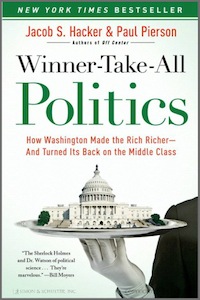I finally got to the book Winner-Take-All Politics, by Jacob Hacker and Paul Pierson, published in 2010. What the authors provide is a clear, easy to read review of the last thirty years of American politics and economic policy in an effort to better understand, as stated in the book's secondary title, how Washington made the rich richer - and turned its back on the middle class.
The largely GOP-fueled shift to emphasis on tax cuts for the corporate sector and the superrich, deregulation, and the trimming or (envisioned) privatization of government social programs got started in the late 1970s. This mostly libertarian agenda has carried into the present, done profound damage to the economy, and created political paralysis in Washington. (The Democrats, forced to maintain the image of being a labor party, have gone along with the GOP's rightward trend to a degree, playing a balancing act between populism and libertarianism, and are complicit in the current state of affairs.)
The population in the meantime has become less organized, less unionized, less vocal, less informed, and more cynical and depoliticized. The financial firms in New York are pleased.
In essence, the population has been put out to pasture, with Capitol Hill taking its orders from major corporations and the financial elite who own and operate them. So-called "conservative" charges of domineering Big Government are simply not supported by the basic history. Quite the contrary, the private and state sectors are interconnected and operate in a relationship where the government has become the junior partner.
The libertarian rhetoric moves the conversation away from populism, constantly asserting the view that markets = good, governments = bad. This comes as no surprise, on account of this agenda running counter to public opinion. In other words, what the people want - as revealed by a mountain of polling data - is the opposite of libertarianism. By a good margin, most Americans want healthcare, Social Security, a decent minimum wage, unions, and ample social support programs for those less fortunate. The government - and we sometimes forget - belongs to the people and is there to tend to their basic needs.
The problem, as expertly discussed and analyzed by Hacker and Pierson, is that Washington is focused on the needs of (at most) about 3 million people, and the other 297 million can fend for themselves - "rugged individuality" and "personal responsibility" apply to the population, not the elite.
Concentrated power, be it financial or political, always fears the population, and concern for where voters stand is uttered by members of Congress constantly. The financial elite and their stewards in the House and Senate know quite well they are operating beyond the pale of what Americans want; they also know that the voting public can call a halt to the current paradigm. The only thing standing between the continuation of the last thirty years of winner-take-all politics and a realignment of Washington's focus is the very energies listed above that have been lost in the process: organization, speaking up, getting informed, and our cynicism becoming a thing of the past.
The political machinery in the United States is not broken, as many claim. The government is designed to provide services, to follow orders. It is still doing that, just for a small number of people. Though highly organized and well financed, the private sector cannot compete with organized popular pressure. Both sectors - state and private - are at the mercy of the public, if and when it begins demanding services and issuing orders. Winner-Take-All Politics is a useful educational tool in helping us understand where things got off track, an understanding that will be crucial in setting things on a better course.
Continuing with the theme of my last couple blog posts (May 3, 9), Hacker and Pierson are nothing resembling leftists. They both come from elite institutions and operate within a rational, centrist framework. What they produced was the result of careful, sober, honest research, and the working class stands to benefit from its lessons.
Winner-Take-All Politics is one of the best books written for a general audience I have read in the last couple years. Though the book's 300 pages should have been pared down to a leaner 200, it is a read I highly recommend.
